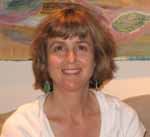
introducing readers to writers since 1995
July 26, 2005
Guest Author: Lisa Williams
by Ron Hogan Letters to Virginia Woolf contains a half-dozen epistolary essays in which Lisa Williams, a literature professor at Ramapo University, addresses the doyenne of modernism on subjects like war and memory, drawing out Woolf's perspective as she elaborates her own. (Williams knows Woolf pretty well; her previous work was a book-length study comparing Woolf to Toni Morrison.) In this essay for Beatrice readers, she talks about the book's beginnings as hope clung to in the aftermath of tragedy.
Letters to Virginia Woolf contains a half-dozen epistolary essays in which Lisa Williams, a literature professor at Ramapo University, addresses the doyenne of modernism on subjects like war and memory, drawing out Woolf's perspective as she elaborates her own. (Williams knows Woolf pretty well; her previous work was a book-length study comparing Woolf to Toni Morrison.) In this essay for Beatrice readers, she talks about the book's beginnings as hope clung to in the aftermath of tragedy.
A Common Interest Unites Us
by Lisa Williams
After 9/11, I returned to Virginia Woolf's words from her pacifist manifesto, Three Guineas: "A common interest unites us; it is one world, one life." She dared to dream of a world without war, a world where race, nationality, history, and culture did not divide people. For so many years, I had been reading and studying Woolf. I still remember at sixteen years old, when I picked up Mrs. Dalloway and read through it. I did not understand a single word, but loved the rhythm and melodies of language moving along the pages, words dancing inside me.During this post-9/11 time, I keep coming back to Mrs. Dalloway. For it is here, in the prophetic voice of her shell-shocked character, Septimus Warren Smith, that Woolf foresees the horrors of the twenty first century, and the senseless loss of young life from war.
As a young man Septimus eagerly enlisted in World War I to fight for the ideals of Shakespeare and his mother country. He came back with the image of his best friend Evans blown up before his very eyes. Septimus solved his problem by not feeling--his words became fractured like the shards of limbs splattering onto fields; and even if he could speak, no one wanted to listen to his grief. No one wanted to hear about the guilt he felt for surviving.As I remember the images of the Twin Towers imploding, I can still see the white debris on the pants of my husband, looking like a moonwalker when he returned from Wall Street. He was lucky to be working five full blocks away from the Trade Center. Still, for a long time, he could not speak of all he had witnessed there. It seems quite clear now that even though life has gone on somewhat normally since then, nothing has ever been quite the same. Inside we have all been trying to heal from what has been breaking.
I think constantly of Septimus as the names of the dead in Iraq flash across my television screen. Many of them were young and eager to fight. And now they are gone. In the midst of so much desolation surrounding us, I can only hold on to Virginia Woolf's words from her essay, "Thoughts of Peace in an Air Raid":
"Unless we can think peace into existence we--not this one body in this one bed but millions of bodies to be born--will lie in the same darkness and hear the same death rattle overhead."Woolf asks us to imagine and work for peace, even as she shows the horrors of war, especially as it is manifested in the psyche of one lone young man, bereft and without language to speak of his sorrow. As I walk around the streets of New York City, just about four years after 9/11, I know for sure that Virginia Woolf captured the sadness of this late date in human history, where the realities of war define the present moment. Still she asks us to continue to dream of peace, to dream of a world united, and to listen to the prophetic voice of the soldier broken by the ravages of war.
your PayPal donation
can contribute towards its ongoing publication.